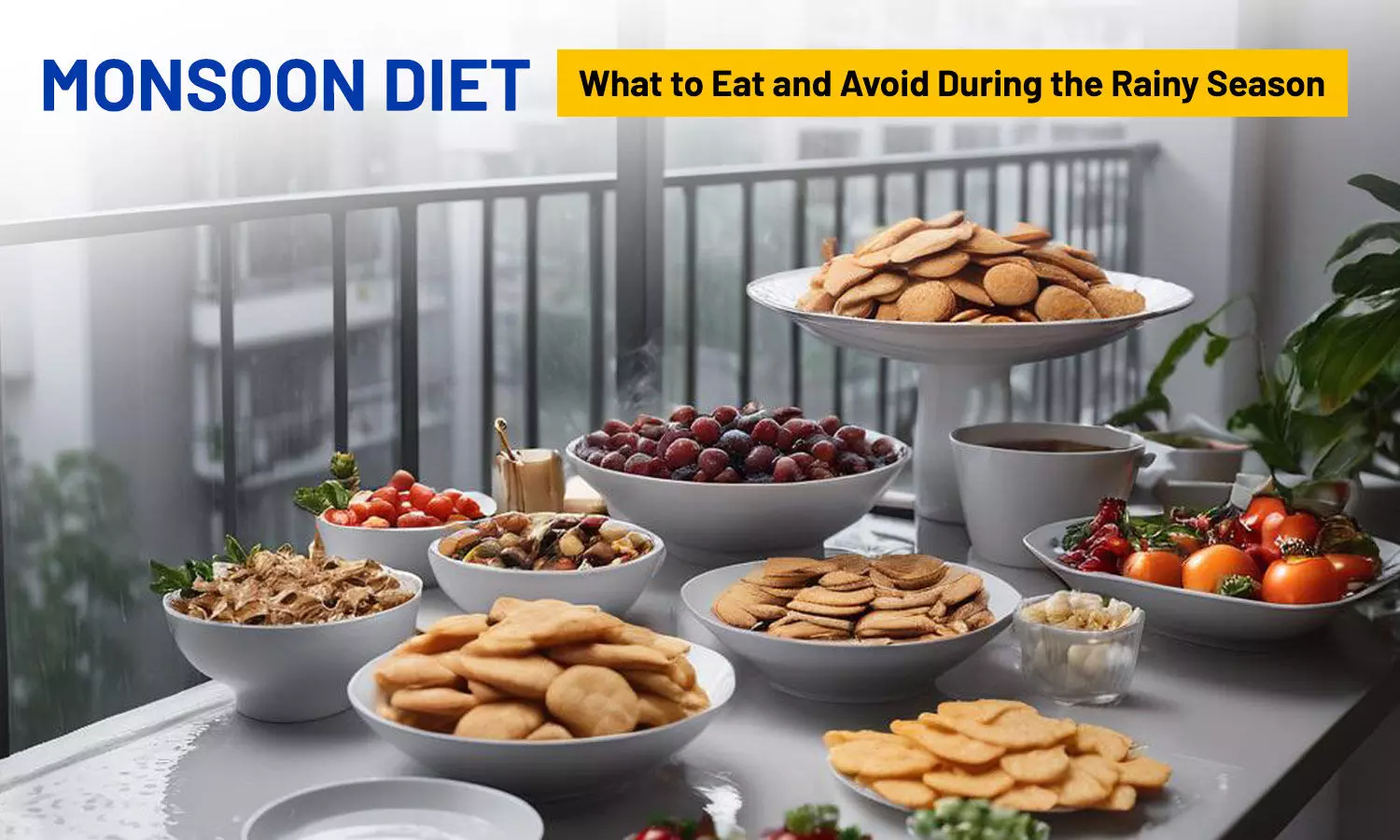Monsoon Diet - Essential Tips for Healthy Eating During the Rainy Season

Monsoon Diet - Essential Tips for Healthy Eating During the Rainy Season
Learn what to eat and avoid during the monsoon season to stay healthy and boost your immunity against infections and illnesses.
As the monsoon clouds gather over the Indian subcontinent, a wave of relief washes over us, bringing a respite from the sweltering summer heat. However, while we enjoy these cool showers, it's essential to remember that the monsoon also brings its own set of health concerns. The increased humidity during monsoons makes our bodies susceptible to several infections and diseases. Therefore, paying attention to our diet during this season is crucial.
Every bite you take should strengthen your immune system and help your body fight against monsoon-related illnesses.
Here is a comprehensive guide on which foods to embrace and which to avoid during the rainy season to maintain a balanced and healthy diet.
Monsoon Diet,Healthy Eating,Rainy Season,Seasonal Vegetables,Clean Produce,Hydration,Probiotics,Avoid Street Food,Warm Beverages,Easy-to-Digest Foods,,Immune-Boosting Foods,Herbal Teas,Ginger and Garlic,Turmeric,Citrus Fruits,Leafy Greens,Moderate Spices,Avoid Oily Foods,Yogurt,Buttermilk,Soups and Broths,Food Storage,Balanced Diet,Small Meals,Food Safety
Seasonal fruits are rich in vitamins and minerals that help boost immunity and should be a part of your diet during the rainy season. Choose pears, apples, lychees, pomegranates, and bananas during monsoon. These fruits have a low water content. They have high potential in reducing the risk of water-borne diseases. However, be cautious when eating mangoes. They can cause skin problems, like pimples.
Hydrate with Warm Liquids
Hydration is key to health, especially during the monsoons, when humidity can lead to dehydration. Opt for warm or hot liquids like herbal teas with ginger, pepper, honey, mint, and basil leaves. These not only keep you hydrated but also have antibacterial properties that enhance immunity. Avoid excessive intake of coffee and tea, as they can dehydrate body fluids.
Eat Light and Fresh
Your monsoon diet should include fresh and light food. Heavy meals can be hard to digest, while fresh food reduces the chances of infections. Go for foods rich in fibre like brown rice, oats, and barley, which are excellent during monsoon. Add garlic to your curries or soups, as it's a natural immunity booster.
Steamed Vegetables
During the monsoon season, raw vegetables can carry harmful bacteria and viruses that cause various infections. Include steamed vegetables in your diet instead of raw salads. Steamed vegetables are easier to digest, and the cooking process can effectively remove bacteria.
Include Probiotics
Including probiotic-rich foods like yoghurt and almond milk will aid digestion and boost your immune system. They are a healthy alternative to milk, which can cause bloating and indigestion during monsoons.
Bitter is Better
Bitter vegetables like bitter gourd (karela) and herbs like neem, turmeric, and fenugreek seeds (methi) help strengthen your immune system to prevent infections. Include them in your diet during the rainy season.
Don’ts of Monsoon Diet
The monsoon season not only brings a refreshing change in weather but also increases the risk of waterborne diseases and digestive problems. To stay healthy during this season, it is important to avoid certain foods and practices that can compromise your health. Here are some key "don'ts" to keep in mind for a safe and nutritious monsoon diet:
Avoid Street Food
Street food is a staple for many, but during the monsoon, it can be particularly hazardous. The humid conditions and exposure to rainwater make it easier for bacteria and other pathogens to contaminate these foods. To avoid gastrointestinal infections and food poisoning, it is best to avoid street food and opt for home-cooked meals instead.
Avoid Eating Fried Foods
While fried foods might be tempting during the cool, rainy weather, they can be tough on the digestive system. The high fat content in fried foods slows down digestion and can lead to bloating and discomfort.
Avoid Excessive Salt
Excess salt can cause water retention and bloating, which is particularly uncomfortable during the humid monsoon season, and can also aggravate conditions like hypertension. Reducing salt intake helps maintain fluid balance and avoids unnecessary health complications.
Limit Seafood
Monsoon is usually the breeding season for many fish and other seafood, making them more prone to contamination and infection. Eating seafood during this time increases the risk of foodborne illnesses. It's safer to limit or avoid seafood and wait until the season is over.
Avoid Raw Leafy Greens
Raw leafy vegetables can contain dirt, bacteria, and other pathogens that are difficult to wash away completely, especially during the rainy season. Their consumption can lead to stomach infections. Instead, thoroughly cook leafy greens to kill harmful microorganisms.
The monsoon season provides refreshing relief from the summer heat, but certain precautions need to be taken with regards to diet. The above monsoon diet guide offers information on which foods can improve your health and which pose risks during the rainy season. Staying healthy during monsoons is not just about maintaining the right diet but also about keeping your surroundings clean. Wash your hands before and after meals, ensure that your vegetables are washed well before cooking, and stay hydrated with safe drinking water.









